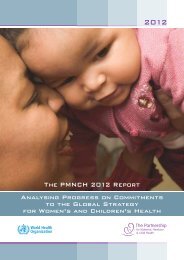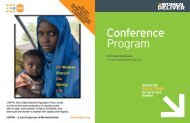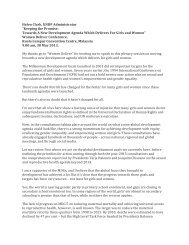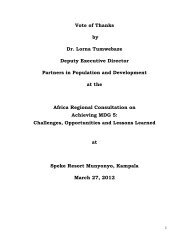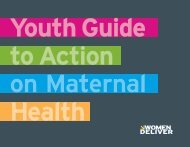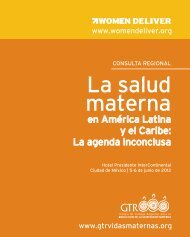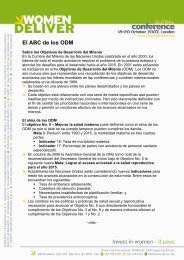State of World Population 2012 - UNFPA Haiti
State of World Population 2012 - UNFPA Haiti
State of World Population 2012 - UNFPA Haiti
You also want an ePaper? Increase the reach of your titles
YUMPU automatically turns print PDFs into web optimized ePapers that Google loves.
tReturning from the field,Kiribati.©<strong>UNFPA</strong>/Ariela Zibiahbetween marriage and childbearing differsdepending on the setting or country, and thecausal relationship between adolescent pregnanciesand early school dropout can be difficultto disentangle.Research using the United <strong>State</strong>s NationalLongitudinal Survey <strong>of</strong> Youth found that earlysexual intercourse had detrimental effects ongirls’ performance in school and educationalattainment, even when socioeconomic backgroundvariables were controlled (Steward,Farkas and Bingenheimer, 2009). Another studyin the United <strong>State</strong>s confirms that motherhoodduring adolescence reduces a girl’s chances <strong>of</strong>obtaining a high school diploma by up to 10 percent, reduces annual income as a young adult by$1,000 to $2,400, and decreases years <strong>of</strong> schooling(Fletcher and Wolfe, 2008).Adolescent pregnancy also obstructs girls’educational achievement in developing countries.Lloyd and Mensch (2008) calculated thecumulative risks in five West African countries<strong>of</strong> girls’ dropping out <strong>of</strong> school before completingtheir secondary education. They estimatethe cumulative risks <strong>of</strong> dropping out as a result<strong>of</strong> adolescent pregnancy (or marriage) to rangebetween 20 per cent in Burkina Faso, Côted’Ivoire, Guinea and Togo to nearly 40 per centin Cameroon. One analysis <strong>of</strong> the impact <strong>of</strong>adolescent motherhood on high school attendanceand completion in Chile finds that beinga mother reduces girls’ likelihood <strong>of</strong> attendingand completing high school by between 24 percent and 37 per cent (Kruger et al., 2009).While some studies find that girls appearmore vulnerable to leaving school once theybecome sexually mature and once they engagein premarital sex, others have concluded thatgirls are more likely to drop out for reasonsother than pregnancy (Biddlecom et al., 2008).In some cases, pregnancy is more likely to bethe consequence <strong>of</strong> early school exit. Evidencefrom South Africa for example, suggests thatpoor performance in school is associated with aheightened risk <strong>of</strong> pregnancy and then a higherrisk <strong>of</strong> dropping out <strong>of</strong> school. This leads tolong-term negative impacts on a woman’s education,skills, employment and income (Grant andHallman, 2006).Impact on women’s labour forceparticipationAccess to reproductive health services, includingfamily planning, also improves women’s opportunitiesto enter the labour force. First, accessallows women to control the timing <strong>of</strong> birthsand thus expand their participation in labourmarkets. This is illustrated by the release <strong>of</strong>Enovid, the first birth control pill, in the United74 CHAPTER 4: THE SOCIAL AND ECONOMIC IMPACT OF FAMILY PLANNING




